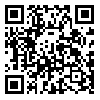Volume 4, Issue 2 (June 2022)
IEEPJ 2022, 4(2): 290-299 |
Back to browse issues page
1- Department of Educational Psychology, Marvdasht Branch, Islamic Azad University, Marvdasht.
2- Department of Psychology, Marvdasht Branch, Islamic Azad University, Marvdasht. ,m_khayyer@yahoo.com
3- Department of Psychology, Marvdasht Branch, Islamic Azad University, Marvdasht.
2- Department of Psychology, Marvdasht Branch, Islamic Azad University, Marvdasht. ,
3- Department of Psychology, Marvdasht Branch, Islamic Azad University, Marvdasht.
Abstract: (2682 Views)
This study aimed to examine the relationships between attachment styles and academic resilience dimensions in students mediated by identity styles. The statistical population of this study was all high school students in Marvdasht (Iran) in 2020. Multi-stage cluster random sampling method was used to select the sample. In this way, 3 girls and 3 boys schools were selected from Marvdasht high schools and then 3 classes were randomly selected from each school. All students in the selected classes (356) completed the questionnaires. The Samuels Academic Resilience Inventory (ARI), Collins Revised Adult Attachment Scale, and Berzonsky Identity Style Inventory were used to collect data. Structural equation modeling was used to test the research hypotheses. According to the results, the tested model had good fit indices. Also, results indicated that attachment styles are related to academic resilience both directly and through identity styles. Overall, the results confirm the role of attachment styles and identity styles in dealing with academic and emotional challenges in school and provide the insight needed to create academic resilience in learners for school counselors.
Type of Study: Original |
Subject:
Educational Psychology
Received: 2021/05/15 | Accepted: 2021/05/28 | Published: 2022/06/1
Received: 2021/05/15 | Accepted: 2021/05/28 | Published: 2022/06/1
References
1. Alborzi, M., Khoshbakht, F., Golzar, H. R., & Sabri, M. (2015). The relationship between attachment styles and resiliency: the mediating role of emotional intelligence. Journal of Developmental Psychology, 11(44), 425-436.
2. Beck, A. T. (1979). Cognitive therapy and the emotional disorders: Penguin.
3. Berzonsky, M. D. (1988). Self-theorists, identity status, and social cognition. In Self, ego, and identity (pp. 243-262): Springer. [DOI:10.1007/978-1-4615-7834-5_12]
4. Berzonsky, M. D. (1992). Identity style: Conceptualization and measurement. Journal of adolescent research, 4(3), 268-282. [DOI:10.1177/074355488943002]
5. Bumpus, J. A. (2014). Transracial adoption: Racial identity, resilience, and self-esteem of African American adoptees. Antioch University New England,
6. Caldera Montes, J. F., Aceves Lupercio, B. I., & Reynoso González, Ó. U. (2016). Resilience in university students. A comparative study among different careers. Psicogente, 19(36), 227-239. [DOI:10.17081/psico.19.36.1294]
7. Chen, K.-H. (2019). Self-identity and self-esteem during different stages of adolescence: The function of identity importance and identity firmness. Chinese Journal of Guidance and Counseling, 55, 27-56.
8. Collins, N. L., & Read, S. J. (1990). Adult attachment, working models, and relationship quality in dating couples. Journal of personality and social psychology, 58(4), 644. [DOI:10.1037/0022-3514.58.4.644]
9. Craparo, G., Magnano, P., Zapparrata, M. V., Gori, A., Costanzo, G., Pace, U., & Pellerone, M. (2018). Coping, attachment style and resilience: the mediating role of alexithymia. Mediterranean Journal of Clinical Psychology, 6(1), 1-30.
10. de la Fuente, J., Fernández-Cabezas, M., Cambil, M., Vera, M. M., González-Torres, M. C., & Artuch-Garde, R. (2017). Linear relationship between resilience, learning approaches, and coping strategies to predict achievement in undergraduate students. Frontiers in psychology, 8, 1039. [DOI:10.3389/fpsyg.2017.01039]
11. Doğulu, C., Karanci, A. N., & Ikizer, G. (2016). How do survivors perceive community resilience? The case of the 2011 earthquakes in Van, Turkey. International Journal of Disaster Risk Reduction, 16, 108-114. [DOI:10.1016/j.ijdrr.2016.02.006]
12. Edwards, T., Catling, J. C., & Parry, E. (2016). Identifying predictors of resilience in students. Psychology teaching review, 22(1), 26-34.
13. Erat, S., Kitapçı, H., & Akçin, K. (2020). Managerial perception and organizational identity: a comparative analysis. Sustainability, 12(6), 2278. [DOI:10.3390/su12062278]
14. Erikson, E. H. (1994). Identity and the life cycle: WW Norton & company.
15. Feeney, J. A., & Noller, P. (1990). Attachment style as a predictor of adult romantic relationships. Journal of personality and social psychology, 58(2), 281. [DOI:10.1037/0022-3514.58.2.281]
16. Mehmannavazan, A., Aliakbaridehkordi, M., & Kakojoybari, A. (2015). Impact of attachment styles, family cohesion and adaptability on the level of resiliency as it relates to the feeling of homesickness among freshman students living in dormitories of alZahra university. Women's Studies Sociological and Psychological, 12(4), 173-204.
17. Mohsentabar Fioozjaee, S., Farahbakhsh, K., Salmabadi, M., & Mohsentabarfiroozjaie, S. (2017). Formulation of Resiliency Models According to Identity Styles and Sense of Failure in Married Teachers in City of Babol. Journal of Educational Psychology Studies, 14(28), 231-252.
18. Osee, T. A., Azeez, R. O., & Akindele-Oscar, Y. (2019). Does Resilience Moderate Academic Motivation and Academic Performance of Secondary School Students in Ogun East Senatorial District, Nigeria? KIU Journal of Humanities, 4(2), 97-106.
19. Rastgar Faraj Zadeh, L., & Mohammadian, A. (2019). The Role of the Mediator of Attachment Styles in the Relationship between Personality Traits and Fetishism. The Neuroscience Journal of Shefaye Khatam, 7(2), 44-55. [DOI:10.29252/shefa.7.2.44]
20. Samuels, W. E. (2004). Development of a non-intellective measure of academic success: Towards the quantification of resilience: The University of Texas at Arlington.
21. Sanchis, R., Canetta, L., & Poler, R. (2020). A conceptual reference framework for enterprise resilience enhancement. Sustainability, 12(4), 2-27. [DOI:10.3390/su12041464]
22. Seligman, M. E., Abramson, L. Y., Semmel, A., & Von Baeyer, C. (1979). Depressive attributional style. Journal of abnormal psychology, 88(3), 242-247. [DOI:10.1037/0021-843X.88.3.242]
23. Simpson, J. A., & Rholes, W. S. E. (1998). Attachment theory and close relationships: The Guilford Press.
24. Smith, J. L., & Hollinger-Smith, L. (2015). Savoring, resilience, and psychological well-being in older adults. Aging & mental health, 19(3), 192-200. [DOI:10.1080/13607863.2014.986647]
25. Soltaninejad, M., Asiabi, M., Ahmdi, B., & Tavanaiee yosefian, S. (2014). A Study of the Psychometric Properties of the Academic Resilience Inventory (ARI). Quarterly of Educational Measurement, 4(15), 17-35.
| Rights and permissions | |
 |
This work is licensed under a Creative Commons Attribution-NonCommercial 4.0 International License. |






